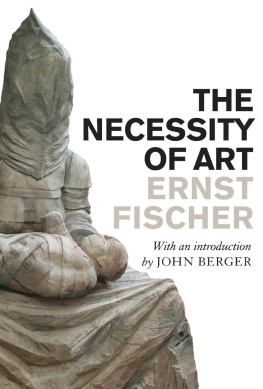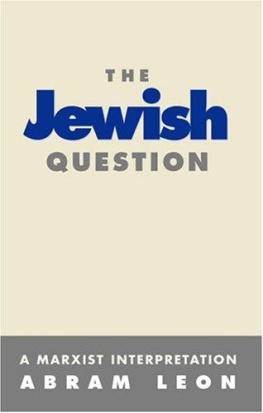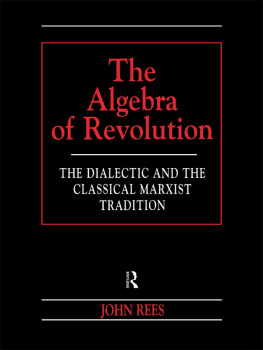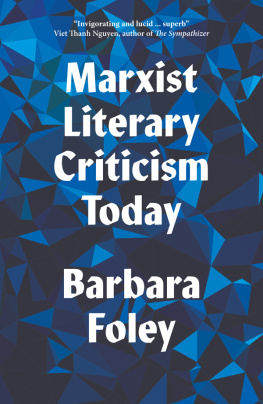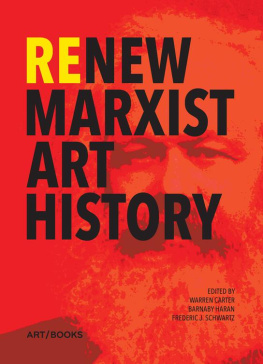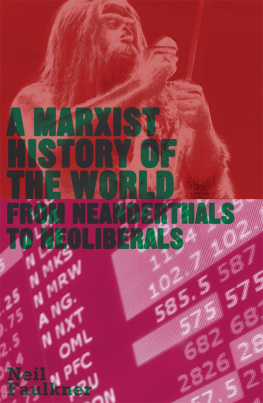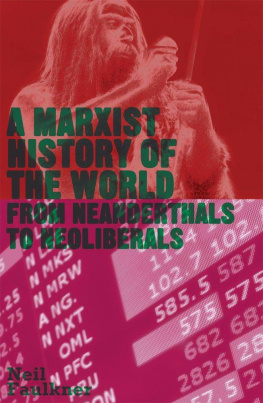Ernst Fischer - The necessity of art : a Marxist approach
Here you can read online Ernst Fischer - The necessity of art : a Marxist approach full text of the book (entire story) in english for free. Download pdf and epub, get meaning, cover and reviews about this ebook. year: 1963, genre: Art. Description of the work, (preface) as well as reviews are available. Best literature library LitArk.com created for fans of good reading and offers a wide selection of genres:
Romance novel
Science fiction
Adventure
Detective
Science
History
Home and family
Prose
Art
Politics
Computer
Non-fiction
Religion
Business
Children
Humor
Choose a favorite category and find really read worthwhile books. Enjoy immersion in the world of imagination, feel the emotions of the characters or learn something new for yourself, make an fascinating discovery.
- Book:The necessity of art : a Marxist approach
- Author:
- Genre:
- Year:1963
- Rating:4 / 5
- Favourites:Add to favourites
- Your mark:
- 80
- 1
- 2
- 3
- 4
- 5
The necessity of art : a Marxist approach: summary, description and annotation
We offer to read an annotation, description, summary or preface (depends on what the author of the book "The necessity of art : a Marxist approach" wrote himself). If you haven't found the necessary information about the book — write in the comments, we will try to find it.
The necessity of art : a Marxist approach — read online for free the complete book (whole text) full work
Below is the text of the book, divided by pages. System saving the place of the last page read, allows you to conveniently read the book "The necessity of art : a Marxist approach" online for free, without having to search again every time where you left off. Put a bookmark, and you can go to the page where you finished reading at any time.
Font size:
Interval:
Bookmark:
ERNST FISCHER
THE NECESSITY OF ART
A Marxist Approach
TRANSLATED BY
ANNA BOSTOCK


Penguin Books
Penguin Books Ltd, Harmondsworth, Middlesex, England
Penguin Books Inc., 7110 Ambassador Road, Baltimore, Maryland 21207, U.S.A. Penguin Books Australia Ltd, Ringwood, Victoria, Australia
Von der Notwendigkeit der Kunst first published by
Verlag der Kunst, Dresden, 1959
This translation first published 1963
Reprinted 1964, 1970, 197I
Copyright Ernst Fischer, 1959
Translation copyright Anna Bostock, 1963
Made and printed in Great Britain
by Cox & Wyman Ltd,
London, Reading and Fakenham
Set in Monotype Garamond
This book is sold subject to the conditionthat it shall not, by way of trade or otherwise, be lent, re-sold, hired out, or otherwise circulated without the publisher's prior consent in any form of binding or cover other than that in which it is published and without a similar condition including this condition being imposedon the subsequent purchaser
CHAPTER ONE
THE FUNCTION OF ART
Poetry is indispensableif I only knew what for. With this charmingly paradoxical epigram Jean Cocteau has summed up the necessity of artas well as its questionable role in the late bourgeois world.
The painter Mondrian spoke of the possible disappearance of art. Reality would, he believed, increasingly displace the work of art, which was essentially a substitute for an equilibrium that reality lacked at present. Art will disappear as life gains more equilibrium.
Art as a life substitute, art as a means of putting man in a state of equilibrium with the surrounding worldthe idea contains a partial recognition of the nature of art and its necessity. And since a perpetual equilibrium between man and the surrounding world cannot be expected to exist even in the most highly developed society, the idea suggests, too, that art was not merely necessary in the past but will always remain so.
Yet is art really no more than a substitute? Does it not also express a deeper relationship between man and the world? Indeed, can the function of art be summed up at all in a single formula? Does it not have to satisfy many and various needs? And if, as we reflect upon the origins of art, we become aware of its initial function, has not that function also changed with the changing of society, and have not new functions come into being?
This book is an attempt to answer questions such as these, founded on the conviction that art has been, still is, and always will be necessary.
As a first step we must realize that we are inclined to take an astonishing phenomenon too much for granted. And it is certainly astonishing: countless millions read books, listen to music, watch the theatre, go to the cinema. Why? To say that they seek distraction, relaxation, entertainment, is to beg the question. Why is it distracting, relaxing, entertaining to sink oneself in someone else's life and problems, to identify oneself with a painting or a piece of music or with the characters in a novel, play, or film? Why do we respond to such unreality as though it were reality intensified? What strange, mysterious entertainment is this? And if one answers that we want to escape from an unsatisfactory existence into a richer one, into experience without risk, then the next question arises: why is our own existence not enough? Why this desire to fulfill our unfulfilled lives through other figures, other forms, to gaze from the darkness of an auditorium at a lighted stage where something that is only play can so utterly absorb us?
Evidently man wants to be more than just himself. He wants to be a whole man. He is not satisfied with being a separate individual; out of the partiality of his individual life he strives towards a fulness that he senses and demands, towards a fulness of life of which individuality with all its limitations cheats him, towards a more comprehensible, a more just world, a world that makes sense . He rebels against having to consume himself within the confines of his own life, within the transient, chance limits of his own personality. He wants to refer to something that is more than I, something outside himself and yet essential to himself. He longs to absorb the surrounding world and make it his own; to extend his inquisitive, world-hungry I in science and technology as far as the remotest constellations and as deep as the innermost secrets of the atom; to unite his limited I in art with a communal existence; to make his individuality social .
If it were man's nature to be no more than an individual, this desire would be incomprehensible and senseless, for as anindividual he would then be a whole: he would be all that he was capable of being. Man's desire to be increased and supplemented indicates that he is more than an individual. He feels that he can attain wholeness only if he takes possession of the experiences of others that might potentially be his own. Yet what a man apprehends as his potential includes everything that humanity as a whole is capable of. Art is the indispensable means for this merging of the individual with the whole. It reflects his infinite capacity for association, for sharing experiences and ideas.
And yet: is this definition of art as the means of becoming one with the whole of reality, as the individual's way to the world at large, as the expression of his desire to identify himself with what he is not, perhaps too romantic? Is it not rash to conclude, on the basis of our own near-hysterical sense of identification with the hero of a film or a novel, that this is the universal and original function of art? Does art not also contain the opposite of this Dionysian losing of oneself? Does it not also contain the Apollonian element of entertainment and satisfaction which consists precisely in the fact that the onlooker does not identify himself with what is represented but gains distance from it, overcomes the direct power of reality through its deliberate representation, and finds, in art, that happy freedom of which the burdens of everyday life deprive him? And is not the same dualityon the one hand the absorption in reality, on the other the excitement of controlling italso evident in the way the artist himself works? For make no mistake about it, work for an artist is a highly conscious, rational process at the end of which the work of art emerges as mastered realitynot at all a state of intoxicated inspiration.
In order to be an artist it is necessary to seize, hold, and transform experience into memory, memory into expression, material into form. Emotion for an artist is not everything; he must also know his trade and enjoy it, understand all the rules, skills, forms, and conventions whereby naturethe shrewcan be tamed and subjected to the contract of art. The passion that consumes the dilettante serves the true artist: the artist is not mauled by the beast, he tames it.
Tension and dialectical contradiction are inherent in art; not only must art derive from an intense experience of reality, it must also be constructed , it must gain form through objectivity. The free play of art is the result of mastery. Aristotle, so often misunderstood, held that the function of drama was to purify the emotions, to overcome terror and pity, so that the spectator identifying himself with Orestes or Oedipus was liberated from that identification and lifted above the blind workings of fate. The ties of life are temporarily cast off, for art captivates in a different way from reality, and this pleasant temporary captivity is precisely the nature of the entertainment, of that pleasure which is derived even from tragic works.
Next pageFont size:
Interval:
Bookmark:
Similar books «The necessity of art : a Marxist approach»
Look at similar books to The necessity of art : a Marxist approach. We have selected literature similar in name and meaning in the hope of providing readers with more options to find new, interesting, not yet read works.
Discussion, reviews of the book The necessity of art : a Marxist approach and just readers' own opinions. Leave your comments, write what you think about the work, its meaning or the main characters. Specify what exactly you liked and what you didn't like, and why you think so.

